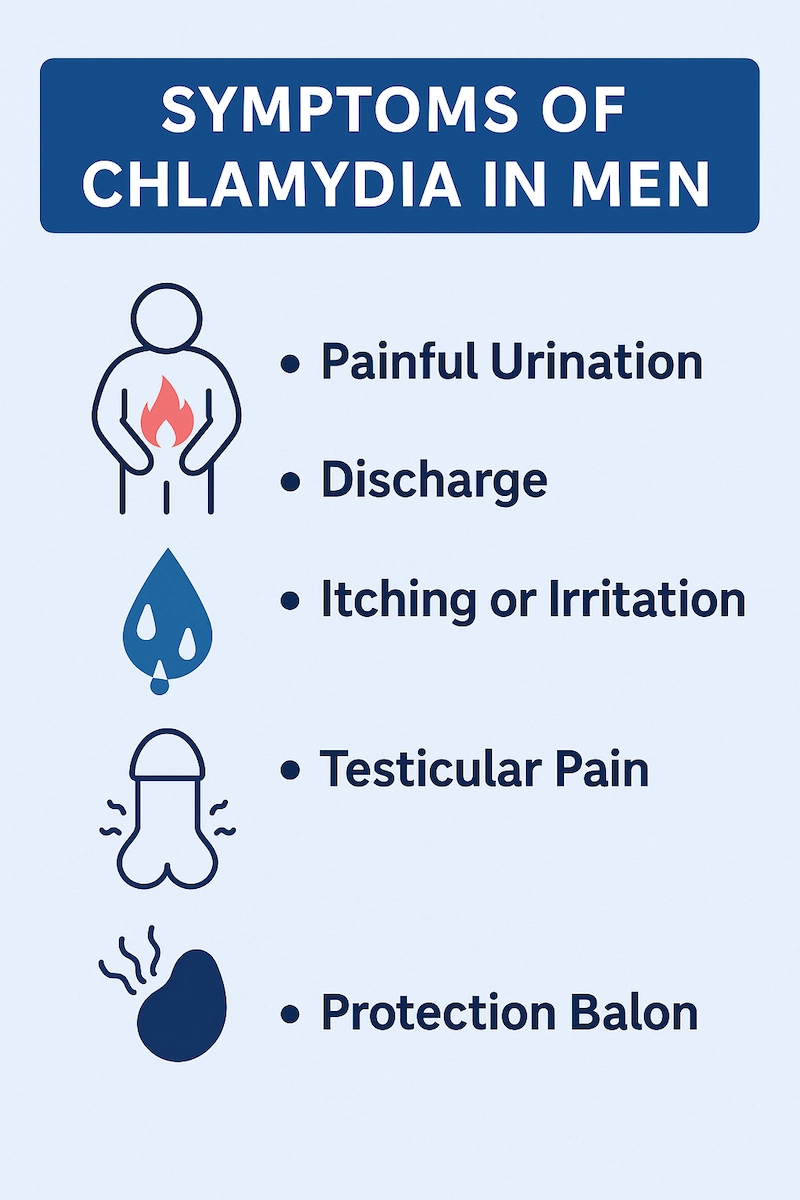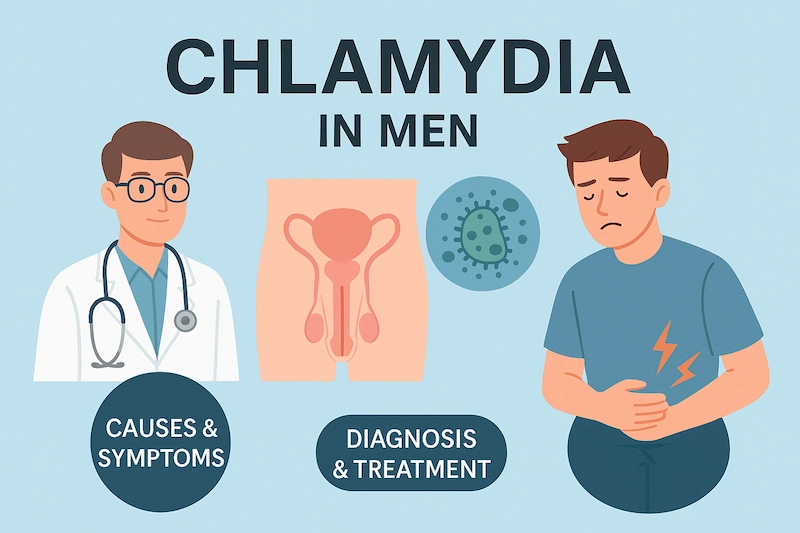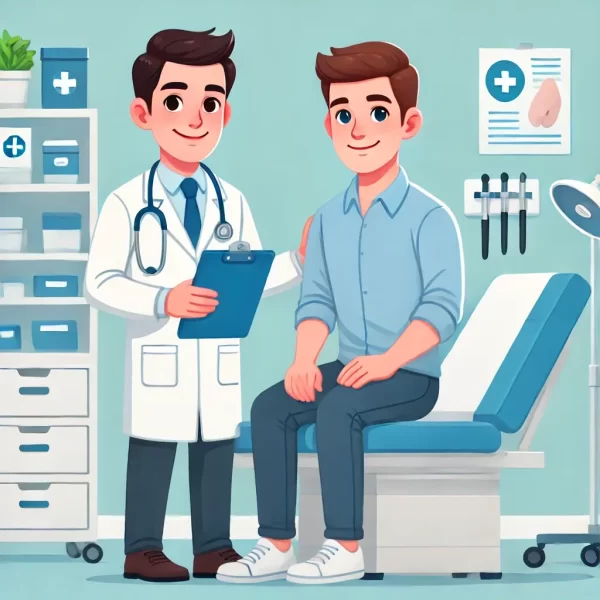Chlamydia is one of the most common sexually transmitted infections (STIs) affecting men worldwide. Caused by the bacterium Chlamydia trachomatis, this infection is often silent, meaning most men won’t experience noticeable symptoms—yet it can still cause complications and be passed to others.
If left untreated, chlamydia can lead to painful urination, testicular inflammation, and infertility. The good news is that it’s easily diagnosed with a simple test and cured with antibiotics.
In this article, we’ll explore the symptoms, how chlamydia spreads, the importance of regular testing, and what treatment looks like for men.
What Is Chlamydia?
Chlamydia in men is a common sexually transmitted infection (STI) caused by the bacterium Chlamydia trachomatis. It’s one of the most frequently reported STIs worldwide—especially among sexually active men under the age of 35.
The infection primarily affects the urethra, but can also impact the rectum, throat, and even the eyes (in rare cases). Many men with chlamydia experience no noticeable symptoms, which is why it’s often called a “silent infection.”
Despite its mild or invisible symptoms, chlamydia can cause serious complications if left untreated, including epididymitis, infertility, and increased susceptibility to other STIs like HIV.
🔍 Key Facts About Chlamydia Infection in Men:
- Caused by the bacteria Chlamydia trachomatis
- Spread through unprotected vaginal, anal, or oral sex
- Can be passed even when no symptoms are present
- Easily diagnosed through urine or swab tests
- Curable with a short course of antibiotics
How Common Is It?
- In the U.S. alone, over 1.5 million new chlamydia cases are reported annually
- Many more go undiagnosed due to lack of symptoms
- Men who have sex with men (MSM) and young adults are at higher risk
📌 Understanding what chlamydia is—and how it silently spreads—is the first step in protecting your sexual health and your partners.
How Do Men Get Chlamydia?
Chlamydia in men is spread primarily through unprotected sexual contact with an infected partner. The bacteria Chlamydia trachomatis lives in semen, vaginal fluids, and rectal secretions, making it easily transmittable—even when no symptoms are present.
1. Vaginal, Anal, and Oral Sex
Chlamydia can be passed during:
- Vaginal intercourse (most common route)
- Anal sex, especially among men who have sex with men (MSM)
- Oral sex, although less common, can still lead to throat infections
Even brief sexual contact without ejaculation can transmit the bacteria.
2. Asymptomatic Carriers
Many individuals infected with chlamydia have no symptoms at all, especially women. A man may contract chlamydia from a partner who:
- Feels completely healthy
- Has never been diagnosed
- Believes they are STI-free
📍 This silent transmission is why regular testing is essential, even if you feel fine.
3. Reinfection and Partner Exposure
Being treated once does not protect you from future infections. You can get chlamydia again if:
- You have unprotected sex with an untreated partner
- A new or casual partner is unknowingly infected
- You or your partner skip follow-up testing or treatment
Both partners should be tested and treated to prevent ping-pong infections (repeated reinfection between partners).
4. Risk Factors for Chlamydia in Men
You may be at higher risk if you:
- Are under 30 and sexually active
- Have multiple or new sexual partners
- Don’t use condoms consistently
- Are in a non-monogamous relationship
- Are a man who has sex with men (MSM)
📌 The best way to avoid chlamydia is through safe sex practices, regular STI screenings, and open communication with your partners.
Symptoms of Chlamydia in Men
One of the reasons chlamydia in men spreads so easily is because it often causes no noticeable symptoms. In fact, up to 50% of men with chlamydia are asymptomatic, meaning they can carry and transmit the infection without knowing it.

When symptoms do appear, they usually develop within 1 to 3 weeks after exposure and primarily affect the urethra, testicles, or rectum—depending on the site of infection.
Common Symptoms of Chlamydia in Men:
1. Painful or Burning Urination
A frequent and uncomfortable symptom caused by inflammation of the urethra.
2. Penile Discharge
- Thin or milky white, yellow, or clear fluid from the penis
- Often noticed in the morning or after urination
3. Itching or Irritation at the Tip of the Penis
Sometimes mistaken for other causes like soap, but may be a sign of infection.
4. Testicular Pain or Swelling
This can indicate epididymitis, a potential complication of untreated chlamydia that may affect fertility.
5. Pain or Discomfort During Ejaculation
Less common but can occur if inflammation is more widespread.
🔍 Rectal Chlamydia Symptoms (MSM or anal exposure):
- Rectal pain or pressure
- Mucus discharge from the anus
- Bleeding or spotting
- Itching or irritation
📍 These symptoms are often mistaken for hemorrhoids or minor issues—leading to delayed diagnosis.
Asymptomatic Infections
Many men feel completely normal while carrying chlamydia, making routine testing the only reliable way to know your status.
📌 If you notice any unusual symptoms—or have had unprotected sex with a new partner—don’t wait. Get tested as soon as possible to protect your health and prevent spreading the infection.
Possible Complications if Left Untreated
While chlamydia in men is highly treatable, ignoring it can lead to serious and sometimes permanent complications—even if you never experienced any symptoms. That’s why early diagnosis and treatment are critical for long-term health.
1. Epididymitis
If left untreated, chlamydia can spread to the epididymis—the coiled tube at the back of the testicle—causing:
- Pain or swelling in one or both testicles
- Tenderness and warmth
- Fever in some cases
Untreated epididymitis can result in scarring that blocks sperm and affects fertility.
2. Male Infertility
Long-term infection can damage the reproductive tract, leading to:
- Decreased sperm quality or flow
- Blocked tubes
- Inflammatory damage
Although not as common as in women, chlamydia-induced infertility is a real risk in men.
3. Prostatitis
Chronic chlamydia infections may contribute to prostate inflammation, leading to:
- Pelvic or lower back pain
- Pain during ejaculation
- Urinary discomfort or urgency
4. Increased Risk of HIV
Chlamydia can cause inflammation in the genital tract, making it easier for HIV to enter the body if exposed. It also increases the risk of transmitting HIV to others if co-infected.
5. Passing the Infection to Partners
Without treatment, you may unknowingly infect:
- Long-term partners
- Future partners
- Pregnant women (in heterosexual relationships), which can lead to birth complications
📌 Early treatment not only prevents these complications but also protects your sexual partners and future fertility.
Chlamydia Testing for Men
Because chlamydia in men often causes no symptoms, testing is the only reliable way to know if you’re infected. Fortunately, chlamydia testing is simple, painless, and widely available—often done in under 15 minutes.
1. When Should Men Get Tested for Chlamydia?
You should get tested if you:
- Have had unprotected sex with a new or casual partner
- Show symptoms such as burning urination or discharge
- Have a partner who tested positive for chlamydia or another STI
- Are sexually active and under 30 years old
- Are a man who has sex with men (MSM)
- Are in a non-monogamous relationship
📍 Regular screening every 6–12 months is recommended for sexually active men, even without symptoms.
2. How Is Chlamydia Diagnosed in Men?
Urine Test (most common)
- You provide a urine sample at a clinic or lab
- Detects the presence of Chlamydia trachomatis in the urethra
Urethral Swab (less common)
- A swab is inserted into the urethra to collect fluid
- Used if symptoms are more severe or discharge is present
Rectal or Throat Swab
- Recommended for MSM or if anal/oral exposure is suspected
- Helps identify infection in the rectum or throat
At-Home Test Kits
- Available from trusted clinics or pharmacies
- Discreet, mailed directly to your home
- You collect the sample and mail it back for results
3. Confidentiality and Privacy
STI testing is confidential in most countries. Your results won’t be shared without your consent. Many clinics also offer:
- Anonymous testing
- Free or low-cost services
- Counseling and partner notification support
📌 Don’t wait for symptoms—testing is the most responsible step you can take for your health and your partner’s.
Treatment for Chlamydia
The good news is that chlamydia in men is easily treatable with antibiotics. Once diagnosed, starting treatment promptly not only clears the infection but also helps prevent transmission and long-term complications like infertility.
1. Antibiotics for Chlamydia
The most common medications prescribed include:
Doxycycline (first-line):
100 mg twice daily for 7 days
Highly effective and well-tolerated
Azithromycin (alternative option):
Single 1-gram dose
Often used if doxycycline isn’t appropriate (e.g., allergy)
These antibiotics kill the bacteria and stop the infection. It’s important to take all prescribed doses, even if symptoms improve before finishing the course.
2. How Long Until Chlamydia Is Cured?
- With doxycycline: infection is usually cleared within 7 days
- With azithromycin: effective after one single dose, but precautions apply
- Do not have sex for at least 7 days after completing treatment
- Follow-up testing is usually not necessary unless:
- You still have symptoms
You’re unsure if your partner was treated
You’re at high risk for reinfection

3. When to Avoid Sexual Activity
- Avoid all sexual contact for at least 7 full days after starting treatment
- If you resume sex too early, you may still be contagious and can infect or reinfect your partner
4. Partner Treatment Is Essential
Your sexual partner(s) should be tested and treated at the same time, even if they don’t have symptoms. This prevents:
- Reinfection (ping-pong effect)
- Ongoing transmission to others
- Potential complications for your partner
Some clinics offer Expedited Partner Therapy (EPT)—where your partner can receive treatment without an in-person exam.
5. Follow-Up and Retesting
- Retesting is often recommended after 3 months, especially for men under 25 or with new partners
- If symptoms return, get retested immediately
- Those with repeat infections may require additional counseling or STI screening
📌 Chlamydia is highly curable—but only if treated properly and completely. Don’t skip medication, ignore follow-up, or leave your partner untreated.
Preventing Chlamydia Infection
While chlamydia is one of the most common STIs, it’s also one of the most preventable. By taking a few proactive steps, men can significantly lower their risk of getting or spreading the infection.
✅ 1. Use Condoms Consistently and Correctly
Latex or polyurethane condoms provide a strong barrier that prevents the spread of Chlamydia trachomatis during vaginal, anal, and even oral sex.
- Use a new condom every time you have sex
- Put it on before any genital contact begins
- Use water-based or silicone-based lubricants to prevent breakage
📍 Even if your partner seems healthy, they could carry the infection without knowing it.
✅ 2. Get Tested Regularly
Routine STI screening helps catch infections early—before symptoms appear or spread to partners.
- Every 6–12 months if you’re sexually active with multiple partners
- Before starting a new relationship
- After unprotected sex or a known exposure
✅ 3. Talk Openly with Sexual Partners
Communication is key. Ask about:
- Their last STI test
- Use of protection
- Any past or current infections
Honest conversations may feel awkward, but they protect both of you.
✅ 4. Practice Mutual Monogamy
Being in a mutually monogamous relationship with a tested, uninfected partner can greatly reduce STI risk.
If monogamy isn’t realistic, focus on consistent condom use and routine testing.
✅ 5. Don’t Rely on Symptoms Alone
Remember: chlamydia often causes no symptoms. You or your partner could have it and feel completely fine. Prevention is about habits—not just how you feel.
✅ 6. Avoid Sharing Sex Toys Without Proper Cleaning
If you share sex toys:
- Cover them with a new condom
- Clean them thoroughly between uses
- Don’t share without disinfecting
📌 Prevention isn’t about perfection—it’s about making safer choices consistently. Combining condom use, regular testing, and honest communication offers powerful protection.
FAQs About Chlamydia in Men
❓ Can men get chlamydia from oral sex?
Yes. While less common, chlamydia can be transmitted through oral sex, especially if the partner has an active throat infection.
❓ Can I have chlamydia and not know it?
Absolutely. Many men have no symptoms but can still spread the infection. Regular testing is the only way to know for sure.
❓ How long does it take for chlamydia to go away after treatment?
Most men are cured within 7 days of starting antibiotics. You should avoid sex during this time to prevent reinfection or transmission.
❓ Can chlamydia go away on its own?
No. Chlamydia does not clear up without treatment. Even if symptoms disappear, the infection can remain and cause complications.
❓ Can I get chlamydia more than once?
Yes. Having chlamydia once does not protect you from getting it again. You can be reinfected if exposed again through an untreated or new partner.
❓ Will chlamydia affect my fertility?
If left untreated, chlamydia can damage the reproductive system, leading to conditions like epididymitis and even infertility in some cases.
❓ Do I have to tell my partner if I test positive?
Yes. It’s important to let your current and recent partners know so they can get tested and treated too. This helps prevent reinfection and further spread.
📌 STI-related questions are normal. The more you ask, the more confident and informed you become in protecting your health.
Final Thoughts
Chlamydia in men is common, silent, and 100% treatable—but only if you know it’s there. Because symptoms are often mild or absent, many men unknowingly carry the infection and pass it to others.
The solution is simple:
✔️ Get tested regularly
✔️ Use protection
✔️ Treat promptly
✔️ Talk honestly with your partners
A short course of antibiotics can cure chlamydia completely, but ignoring it can lead to long-term damage, including infertility. Don’t let fear or embarrassment stop you from taking control of your health.
👉 Being proactive about STIs isn’t just responsible—it’s empowering. Get tested, get treated, and protect yourself and those you care about.





